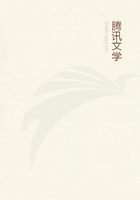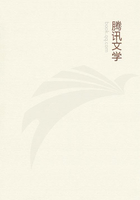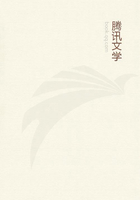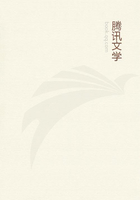It was the greeting of the general's daughter.I had heard nothing--no rustle,no footsteps.I had felt only a moment before a sort of premonition of evil;I had the sense of an inauspicious presence--just that much warning and no more;and then came the sound of the voice and the jar as of a terrible fall from a great height--a fall,let us say,from the highest of the clouds floating in gentle procession over the fields in the faint westerly air of that July afternoon.I picked myself up quickly,of course;in other words,I jumped up from my chair stunned and dazed,every nerve quivering with the pain of being uprooted out of one world and flung down into another--perfectly civil.
"Oh!How do you do?Won't you sit down?"
That's what I said.This horrible but,I assure you,perfectly true reminiscence tells you more than a whole volume of confessions a la Jean Jacques Rousseau would do.Observe!I didn't howl at her,or start upsetting furniture,or throw myself on the floor and kick,or allow myself to hint in any other way at the appalling magnitude of the disaster.The whole world of Costaguana (the country,you may remember,of my seaboard tale),men,women,headlands,houses,mountains,town,campo (there was not a single brick,stone,or grain of sand of its soil I had not placed in position with my own hands);all the history,geography,politics,finance;the wealth of Charles Gould's silver-mine,and the splendour of the magnificent Capataz de Cargadores,whose name,cried out in the night (Dr.Monygham heard it pass over his head--in Linda Viola's voice),dominated even after death the dark gulf containing his conquests of treasure and love--all that had come down crashing about my ears.
I felt I could never pick up the pieces--and in that very moment I was saying,"Won't you sit down?"The sea is strong medicine.Behold what the quarter-deck training even in a merchant ship will do!This episode should give you a new view of the English and Scots seamen (a much-caricatured folk)who had the last say in the formation of my character.One is nothing if not modest,but in this disaster I think I have done some honour to their simple teaching."Won't you sit down?"Very fair;very fair indeed.She sat down.Her amused glance strayed all over the room.There were pages of MS.
on the table and under the table,a batch of typed copy on a chair,single leaves had fluttered away into distant corners;there were there living pages,pages scored and wounded,dead pages that would be burnt at the end of the day--the litter of a cruel battlefield,of a long,long and desperate fray.Long!Isuppose I went to bed sometimes,and got up the same number of times.Yes,I suppose I slept,and ate the food put before me,and talked connectedly to my household on suitable occasions.
But I had never been aware of the even flow of daily life,made easy and noiseless for me by a silent,watchful,tireless affection.Indeed,it seemed to me that I had been sitting at that table surrounded by the litter of a desperate fray for days and nights on end.It seemed so,because of the intense weariness of which that interruption had made me aware--the awful disenchantment of a mind realising suddenly the futility of an enormous task,joined to a bodily fatigue such as no ordinary amount of fairly heavy physical labour could ever account for.I have carried bags of wheat on my back,bent almost double under a ship's deck-beams,from six in the morning till six in the evening (with an hour and a half off for meals),so I ought to know.
And I love letters.I am jealous of their honour and concerned for the dignity and comeliness of their service.I was,most likely,the only writer that neat lady had ever caught in the exercise of his craft,and it distressed me not to be able to remember when it was that I dressed myself last,and how.No doubt that would be all right in essentials.The fortune of the house included a pair of grey-blue watchful eyes that would see to that.But I felt somehow as grimy as a Costaguana lepero after a day's fighting in the streets,rumpled all over and dishevelled down to my very heels.And I am afraid I blinked stupidly.All this was bad for the honour of letters and the dignity of their service.Seen indistinctly through the dust of my collapsed universe,the good lady glanced about the room with a slightly amused serenity.And she was smiling.What on earth was she smiling at?She remarked casually:
"I am afraid I interrupted you."
"Not at all."
She accepted the denial in perfect good faith.And it was strictly true.Interrupted--indeed!She had robbed me of at least twenty lives,each infinitely more poignant and real than her own,because informed with passion,possessed of convictions,involved in great affairs created out of my own substance for an anxiously meditated end.
She remained silent for a while,then said with a last glance all round at the litter of the fray:
"And you sit like this here writing your--your.""I--what?Oh,yes,I sit here all day.""It must be perfectly delightful."
I suppose that,being no longer very young,I might have been on the verge of having a stroke;but she had left her dog in the porch,and my boy's dog,patrolling the field in front,had espied him from afar.He came on straight and swift like a cannon-ball,and the noise of the fight,which burst suddenly upon our ears,was more than enough to scare away a fit of apoplexy.We went out hastily and separated the gallant animals.
Afterwards I told the lady where she would find my wife--just round the corner,under the trees.She nodded and went off with her dog,leaving me appalled before the death and devastation she had lightly made--and with the awfully instructive sound of the word "delightful"lingering in my ears.
Nevertheless,later on,I duly escorted her to the field gate.Iwanted to be civil,of course (what are twenty lives in a mere novel that one should be rude to a lady on their account?),but mainly,to adopt the good sound Ollendorffian style,because Idid not want the dog of the general's daughter to fight again (encore)with the faithful dog of my infant son (mon petit garcon).--Was I afraid that the dog of the general's daughter would be able to overcome (vaincre)the dog of my child?--No,Iwas not afraid.But away with the Ollendorff method.However appropriate and seemingly unavoidable when I touch upon anything appertaining to the lady,it is most unsuitable to the origin,character and history of the dog;for the dog was the gift to the child from a man for whom words had anything but an Ollendorffian value,a man almost childlike in the impulsive movements of his untutored genius,the most single-minded of verbal impressionists,using his great gifts of straight feeling and right expression with a fine sincerity and a strong if,perhaps,not fully conscious conviction.His art did not obtain,I fear,all the credit its unsophisticated inspiration deserved.I am alluding to the late Stephen Crane,the author of "The Red Badge of Courage,"a work of imagination which found its short moment of celebrity in the last decade of the departed century.Other books followed.Not many.He had not the time.It was an individual and complete talent,which obtained but a grudging,somewhat supercilious recognition from the world at large.For himself one hesitates to regret his early death.Like one of the men in his "Open Boat,"one felt that he was of those whom fate seldom allows to make a safe landing after much toil and bitterness at the oar.I confess to an abiding affection for that energetic,slight,fragile,intensely living and transient figure.He liked me even before we met on the strength of a page or two of my writing,and after we had met I am glad to think he liked me still.He used to point out to me with great earnestness,and even with some severity,that "a boy ought to have a dog."I suspect that he was shocked at my neglect of parental duties.Ultimately it was he who provided the dog.
Shortly afterwards,one day,after playing with the child on the rug for an hour or so with the most intense absorption,he raised his head and declared firmly:"I shall teach your boy to ride."That was not to be.He was not given the time.
But here is the dog--an old dog now.Broad and low on his bandy paws,with a black head on a white body and a ridiculous black spot at the other end of him,he provokes,when he walks abroad,smiles not altogether unkind.Grotesque and engaging in the whole of his appearance,his usual attitudes are meek,but his temperament discloses itself unexpectedly pugnacious in the presence of his kind.As he lies in the firelight,his head well up,and a fixed,far-away gaze directed at the shadows of the room,he achieves a striking nobility of pose in the calm consciousness of an unstained life.He has brought up one baby,and now,after seeing his first charge off to school,he is bringing up another with the same conscientious devotion,but with a more deliberate gravity of manner,the sign of greater wisdom and riper experience,but also of rheumatism,I fear.
From the morning bath to the evening ceremonies of the cot you attend,old friend,the little two-legged creature of your adoption,being yourself treated in the exercise of your duties with every possible regard,with infinite consideration,by every person in the house--even as I myself am treated;only you deserve it more.The general's daughter would tell you that it must be "perfectly delightful."Aha!old dog.She never heard you yelp with acute pain (it's that poor left ear)the while,with incredible self-command,you preserve a rigid immobility for fear of overturning the little two-legged creature.She has never seen your resigned smile when the little two-legged creature,interrogated sternly,"What are you doing to the good dog?"answers with a wide,innocent stare:
"Nothing.Only loving him,mamma dear!"
The general's daughter does not know the secret terms of self-imposed tasks,good dog,the pain that may lurk in the very rewards of rigid self-command.But we have lived together many years.We have grown older,too;and though our work is not quite done yet we may indulge now and then in a little introspection before the fire--meditate on the art of bringing up babies and on the perfect delight of writing tales where so many lives come and go at the cost of one which slips imperceptibly away.
Chapter VI.
In the retrospect of a life which had,besides its preliminary stage of childhood and early youth,two distinct developments,and even two distinct elements,such as earth and water,for its successive scenes,a certain amount of naiveness is unavoidable.
I am conscious of it in these pages.This remark is put forward in no apologetic spirit.As years go by and the number of pages grows steadily,the feeling grows upon one too that one can write only for friends.Then why should one put them to the necessity of protesting (as a friend would do)that no apology is necessary,or put,perchance,into their heads the doubt of one's discretion?So much as to the care due to those friends whom a word here,a line there,a fortunate page of just feeling in the right place,some happy simplicity,or even some lucky subtlety,has drawn from the great multitude of fellow-beings even as a fish is drawn from the depths of the sea.Fishing is notoriously (I am talking now of the deep sea)a matter of luck.As to one's enemies,those will take care of themselves.
There is a gentleman,for instance,who,metaphorically speaking,jumps upon me with both feet.This image has no grace,but it is exceedingly apt to the occasion--to the several occasions.Idon't know precisely how long he had been indulging in that intermittent exercise,whose seasons are ruled by the custom of the publishing trade.Somebody pointed him out (in printed shape,of course)to my attention some time ago,and straightway I experienced a sort of reluctant affection for that robust man.
He leaves not a shred of my substance untrodden:for the writer's substance is his writing;the rest of him is but a vain shadow,cherished or hated on uncritical grounds.Not a shred!
Yet the sentiment owned to is not a freak of affectation or perversity.It has a deeper,and,I venture to think,a more estimable origin than the caprice of emotional lawlessness.It is,indeed,lawful,in so much that it is given (reluctantly)for a consideration,for several considerations.There is that robustness,for instance,so often the sign of good moral balance.That's a consideration.It is not,indeed,pleasant to be stamped upon,but the very thoroughness of the operation,implying not only a careful reading,but some real insight into work whose qualities and defects,whatever they may be,are not so much on the surface,is something to be thankful for in view of the fact that it may happen to one's work to be condemned without being read at all.This is the most fatuous adventure that can well happen to a writer venturing his soul amongst criticisms.It can do one no harm,of course,but it is disagreeable.It is disagreeable in the same way as discovering a three-card-trick man amongst a decent lot of folk in a third-class compartment.The open impudence of the whole transaction,appealing insidiously to the folly and credulity of mankind,the brazen,shameless patter,proclaiming the fraud openly while insisting on the fairness of the game,give one a feeling of sickening disgust.The honest violence of a plain man playing a fair game fairly--even if he means to knock you over--may appear shocking,but it remains within the pale of decency.Damaging as it may be,it is in no sense offensive.One may well feel some regard for honesty,even if practised upon one's own vile body.
But it is very obvious that an enemy of that sort will not be stayed by explanations or placated by apologies.Were I to advance the plea of youth in excuse of the naiveness to be found in these pages,he would be likely to say "Bosh!"in a column and a half of fierce print.Yet a writer is no older than his first published book,and,notwithstanding the vain appearances of decay which attend us in this transitory life,I stand here with the wreath of only fifteen short summers on my brow.
With the remark,then,that at such tender age some naiveness of feeling and expression is excusable,I proceed to admit that,upon the whole,my previous state of existence was not a good equipment for a literary life.Perhaps I should not have used the word literary.That word presupposes an intimacy of acquaintance with letters,a turn of mind and a manner of feeling to which Idare lay no claim.I only love letters;but the love of letters does not make a literary man,any more than the love of the sea makes a seaman.And it is very possible,too,that I love the letters in the same way a literary man may love the sea he looks at from the shore--a scene of great endeavour and of great achievements changing the face of the world,the great open way to all sorts of undiscovered countries.No,perhaps I had better say that the life at sea--and I don't mean a mere taste of it,but a good broad span of years,something that really counts as real service--is not,upon the whole,a good equipment for a writing life.God forbid,though,that I should be thought of as denying my masters of the quarter-deck.I am not capable of that sort of apostasy.I have confessed my attitude of piety towards their shades in three or four tales,and if any man on earth more than another needs to be true to himself as he hopes to be saved,it is certainly the writer of fiction.
What I meant to say,simply,is that the quarter-deck training does not prepare one sufficiently for the reception of literary criticism.Only that,and no more.But this defect is not without gravity.If it be permissible to twist,invert,adapt (and spoil)M.Anatole France's definition of a good critic,then let us say that the good author is he who contemplates without marked joy or excessive sorrow the adventures of his soul amongst criticisms.Far be from me the intention to mislead an attentive public into the belief that there is no criticism at sea.That would be dishonest,and even impolite.Everything can be found at sea,according to the spirit of your quest--strife,peace,romance,naturalism of the most pronounced kind,ideals,boredom,disgust,inspiration--and every conceivable opportunity,including the opportunity to make a fool of yourself--exactly as in the pursuit of literature.But the quarter-deck criticism is somewhat different from literary criticism.This much they have in common,that before the one and the other the answering back,as a general rule,does not pay.
Yes,you find criticism at sea,and even appreciation--I tell you everything is to be found on salt water--criticism generally impromptu,and always viva voce,which is the outward,obvious difference from the literary operation of that kind,with consequent freshness and vigour which may be lacking in the printed word.With appreciation,which comes at the end,when the critic and the criticised are about to part,it is otherwise.
The sea appreciation of one's humble talents has the permanency of the written word,seldom the charm of variety,is formal in its phrasing.There the literary master has the superiority,though he,too,can in effect but say--and often says it in the very phrase--"I can highly recommend."Only usually he uses the word "We,"there being some occult virtue in the first person plural,which makes it specially fit for critical and royal declarations.I have a small handful of these sea appreciations,signed by various masters,yellowing slowly in my writing-table's left-hand drawer,rustling under my reverent touch,like a handful of dry leaves plucked for a tender memento from the tree of knowledge.Strange!It seems that it is for these few bits of paper,headed by the names of a few ships and signed by the names of a few Scots and English shipmasters,that I have faced the astonished indignations,the mockeries and the reproaches of a sort hard to bear for a boy of fifteen;that I have been charged with the want of patriotism,the want of sense,and the want of heart too;that I went through agonies of self-conflict and shed secret tears not a few,and had the beauties of the Furca Pass spoiled for me,and have been called an "incorrigible Don Quixote,"in allusion to the book-born madness of the knight.
For that spoil!They rustle,those bits of paper--some dozen of them in all.In that faint,ghostly sound there live the memories of twenty years,the voices of rough men now no more,the strong voice of the everlasting winds,and the whisper of a mysterious spell,the murmur of the great sea,which must have somehow reached my inland cradle and entered my unconscious ear,like that formula of Mohammedan faith the Mussulman father whispers into the ear of his new-born infant,making him one of the faithful almost with his first breath.I do not know whether I have been a good seaman,but I know I have been a very faithful one.And after all there is that handful of "characters"from various ships to prove that all these years have not been altogether a dream.There they are,brief,and monotonous in tone,but as suggestive bits of writing to me as any inspired page to be found in literature.But then,you see,I have been called romantic.Well,that can't be helped.But stay.I seem to remember that I have been called a realist also.And as that charge too can be made out,let us try to live up to it,at whatever cost,for a change.With this end in view,I will confide to you coyly,and only because there is no one about to see my blushes by the light of the midnight lamp,that these suggestive bits of quarter-deck appreciation one and all contain the words "strictly sober."Did I overhear a civil murmur,"That's very gratifying,to be sure"?Well,yes,it is gratifying--thank you.It is at least as gratifying to be certified sober as to be certified romantic,though such certificates would not qualify one for the secretaryship of a temperance association or for the post of official troubadour to some lordly democratic institution such as the London County Council,for instance.The above prosaic reflection is put down here only in order to prove the general sobriety of my judgment in mundane affairs.I make a point of it because a couple of years ago,a certain short story of mine being published in a French translation,a Parisian critic--I am almost certain it was M.Gustave Kahn in the "Gil-Blas"--giving me a short notice,summed up his rapid impression of the writer's quality in the words un puissant reveur.So be it!Who would cavil at the words of a friendly reader?Yet perhaps not such an unconditional dreamer as all that.I will make bold to say that neither at sea nor ashore have I ever lost the sense of responsibility.There is more than one sort of intoxication.
Even before the most seductive reveries I have remained mindful of that sobriety of interior life,that asceticism of sentiment,in which alone the naked form of truth,such as one conceives it,such as one feels it,can be rendered without shame.It is but a maudlin and indecent verity that comes out through the strength of wine.I have tried to be a sober worker all my life--all my two lives.I did so from taste,no doubt,having an instinctive horror of losing my sense of full self-possession,but also from artistic conviction.Yet there are so many pitfalls on each side of the true path that,having gone some way,and feeling a little battered and weary,as a middle-aged traveller will from the mere daily difficulties of the march,I ask myself whether I have kept always,always faithful to that sobriety wherein there is power,and truth,and peace.
As to my sea-sobriety,that is quite properly certified under the sign-manual of several trustworthy shipmasters of some standing in their time.I seem to hear your polite murmur that "Surely this might have been taken for granted."Well,no.It might not have been.That august academical body the Marine Department of the Board of Trade takes nothing for granted in the granting of its learned degrees.By its regulations issued under the first Merchant Shipping Act,the very word SOBER must be written,or a whole sackful,a ton,a mountain of the most enthusiastic appreciation will avail you nothing.The door of the examination rooms shall remain closed to your tears and entreaties.The most fanatical advocate of temperance could not be more pitilessly fierce in his rectitude than the Marine Department of the Board of Trade.As I have been face to face at various times with all the examiners of the Port of London,in my generation,there can be no doubt as to the force and the continuity of my abstemiousness.Three of them were examiners in seamanship,and it was my fate to be delivered into the hands of each of them at proper intervals of sea service.The first of all,tall,spare,with a perfectly white head and moustache,a quiet,kindly manner,and an air of benign intelligence,must,I am forced to conclude,have been unfavourably impressed by something in my appearance.His old thin hands loosely clasped resting on his crossed legs,he began by an elementary question in a mild voice,and went on,went on.It lasted for hours,for hours.Had I been a strange microbe with potentialities of deadly mischief to the Merchant Service I could not have been submitted to a more microscopic examination.Greatly reassured by his apparent benevolence,I had been at first very alert in my answers.But at length the feeling of my brain getting addled crept upon me.
And still the passionless process went on,with a sense of untold ages having been spent already on mere preliminaries.Then I got frightened.I was not frightened of being plucked;that eventuality did not even present itself to my mind.It was something much more serious,and weird."This ancient person,"I said to myself,terrified,"is so near his grave that he must have lost all notion of time.He is considering this examination in terms of eternity.It is all very well for him.His race is run.But I may find myself coming out of this room into the world of men a stranger,friendless,forgotten by my very landlady,even were I able after this endless experience to remember the way to my hired home."This statement is not so much of a verbal exaggeration as may be supposed.Some very queer thoughts passed through my head while I was considering my answers;thoughts which had nothing to do with seamanship,nor yet with anything reasonable known to this earth.I verily believe that at times I was lightheaded in a sort of languid way.
At last there fell a silence,and that,too,seemed to last for ages,while,bending over his desk,the examiner wrote out my pass-slip slowly with a noiseless pen.He extended the scrap of paper to me without a word,inclined his white head gravely to my parting bow.
When I got out of the room I felt limply flat,like a squeezed lemon,and the door-keeper in his glass cage,where I stopped to get my hat and tip him a shilling,said:
"Well!I thought you were never coming out."
"How long have I been in there?"I asked faintly.
He pulled out his watch.
"He kept you,sir,just under three hours.I don't think this ever happened with any of the gentlemen before."It was only when I got out of the building that I began to walk on air.And the human animal being averse from change and timid before the unknown,I said to myself that I would not mind really being examined by the same man on a future occasion.But when the time of ordeal came round again the doorkeeper let me into another room,with the now familiar paraphernalia of models of ships and tackle,a board for signals on the wall,a big long table covered with official forms,and having an unrigged mast fixed to the edge.The solitary tenant was unknown to me by sight,though not by reputation,which was simply execrable.
Short and sturdy as far as I could judge,clad in an old,brown,morning-suit,he sat leaning on his elbow,his hand shading his eyes,and half averted from the chair I was to occupy on the other side of the table.He was motionless,mysterious,remote,enigmatical,with something mournful too in the pose,like that statue of Giuliano (I think)de'Medici shading his face on the tomb by Michael Angelo,though,of course,he was far,far from being beautiful.He began by trying to make me talk nonsense.

